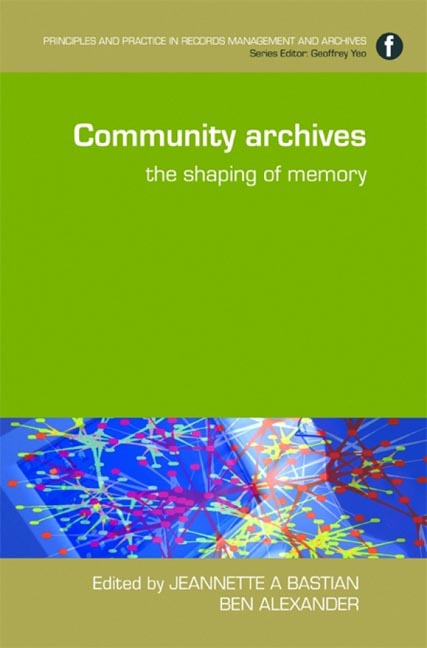Book contents
- Frontmatter
- Contents
- Introduction to the series
- Acknowledgements
- Contributors
- Introduction: Communities and archives – a symbiotic relationship
- Part 1 A community archives model
- Part 2 Communities and non-traditional record keeping
- Part 3 Records loss, destruction and recovery
- 6 Archiving the queer and queering the archives: a case study of the Canadian Lesbian and Gay Archives (CLGA)
- 7 A living archive, shared by communities of records
- 8 Truth commissions and the construction of collective memory: the Chile experience
- Part 4 Online communities: how technology brings communities and their records together
- Part 5 Building a community archive
- Conclusion: The archivist and community
- Bibliography
- Index
- Miscellaneous Endmatter
- Miscellaneous Endmatter
- Miscellaneous Endmatter
8 - Truth commissions and the construction of collective memory: the Chile experience
from Part 3 - Records loss, destruction and recovery
Published online by Cambridge University Press: 08 June 2018
- Frontmatter
- Contents
- Introduction to the series
- Acknowledgements
- Contributors
- Introduction: Communities and archives – a symbiotic relationship
- Part 1 A community archives model
- Part 2 Communities and non-traditional record keeping
- Part 3 Records loss, destruction and recovery
- 6 Archiving the queer and queering the archives: a case study of the Canadian Lesbian and Gay Archives (CLGA)
- 7 A living archive, shared by communities of records
- 8 Truth commissions and the construction of collective memory: the Chile experience
- Part 4 Online communities: how technology brings communities and their records together
- Part 5 Building a community archive
- Conclusion: The archivist and community
- Bibliography
- Index
- Miscellaneous Endmatter
- Miscellaneous Endmatter
- Miscellaneous Endmatter
Summary
Introduction
Following the death of Augusto Pinochet in December 2006, Michelle Bachelet, the current President of Chile, reacted to the news. Herself a victim of torture from the Pinochet regime, President Bachelet stated, ‘I'm not going to deny, in this moment, that I have a very fixed concept concerning a painful, dramatic and complex period that our country lived through … What we learn from the past ought to help us confront the future’ (Reel, 2006).
Records became a powerful resource during this process of ‘learning from the past’. In the US, the 24,000 documents produced by the Chile Declassification Project became strong evidence of the role of the US government during the overthrow of Salvador Allende and the establishment of the Pinochet dictatorship. In Chile, the National Commission on Truth and Reconciliation presented a report documenting 2279 cases of human rights violations. Organizations of victims’ relatives and human rights groups along with the human rights programme of Chile's Ministry of Interior have played an important role in establishing memorials. Additionally, the Archbishopric of Santiago de Chile established an archive that is considered the main repository of materials documenting the repression during the Pinochet years. Pinochet's death also displayed the profound divisions among Chileans over his legacy. While one sector went into the streets to celebrate, others gathered to cry over the death of one whom they saw as Chile's saviour from communism. A fragmented and divided memory of the Pinochet years is still present in Chilean society.
This essay discusses the role of archives and records in Chile during its transition to democracy, with a focus on the work of the National Commission on Truth and Reconciliation. In addition, I will discuss the concept of memory from the Chilean experience, and the role played by archives in the shaping of the country's collective memory.
Transitional justice in Latin America
The period from the 1960s to the 1980s saw an unprecedentedly high level of violence and political repression in Latin America with the establishment of dictatorships in South America and civil wars in Central America. In the midst of the Cold War, Latin America went through a polarized and traumatic period during which gross atrocities took place.
- Type
- Chapter
- Information
- Community ArchivesThe shaping of memory, pp. 133 - 148Publisher: FacetPrint publication year: 2009
- 4
- Cited by



